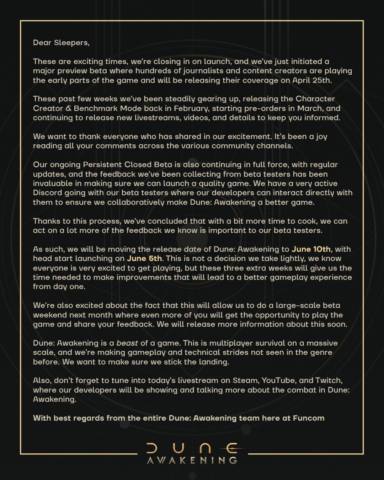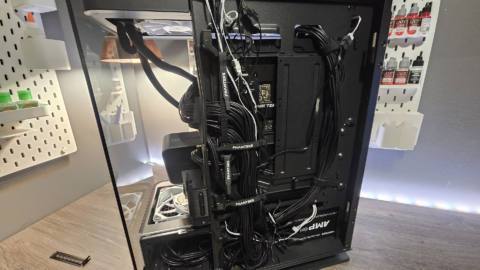After a decade of pumping out mini PCs under the NUC (short for Next Unit of Computing… catchy!) label, Intel officially downed tools on the whole project in 2023. Shortly after, Intel announced a partnership with Asus, who would continue producing NUC PCs under license, and the ROG NUC is the company's first gaming-focused offering.
It's a neat, compact, matte-black package, and comes in two flavours: the ROG NUC 760 (Core Ultra 7 155H, RTX 4060 mobile, 16 GB DDR5-5600, 512 GB M.2 drive) and the ROG NUC 970 (Intel Core Ultra 9 185H, RTX 4070 mobile, 32 GB DDR5-5600, 1 TB M.2 drive). Both specs are also available as barebones units called the NUC Extreme, and come without the RAM, M.2 storage or Windows 11 installation, in a plain black version of the chassis.
It's the fully pre-loaded 970 model we're looking at today and it's no slouch, packing Intel's flagship Core Ultra 9 185H coupled with Nvidia's RTX 4070 mobile GPU and a thoroughly ample 32 GB of SODIMM-shaped 5600MHz DDR5 (user-upgradeable to 64GB). It's a well-matched component-set, from which you'd rightly expect power enough for gaming at 1440P.
These innards, though, are built for mobile. Compared to their desktop counterparts, they offer higher efficiency, lower power consumption, enjoy fights in tight spaces, but are naturally less performant. The RTX 4070 Mobile for example, is a different beast from even the basic non-super, non-Ti desktop RTX 4070. With a 128-bit memory bus down from 192-bit, 8GB VRAM rather than the desktop card's 12GB and lower-clocked core and memory, you get roughly a third less performance, give or take.
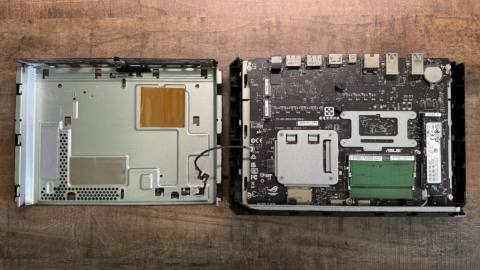
CPU: Intel Core 9 Ultra 185H
GPU: Nvidia RTX 4070 Mobile
Memory: 32GB DDR5 5600
Storage: 1TB PCI-E Gen4 M.2 SSD
Wireless: Intel Killer WiFi 6E, Bluetooth 5.3
I/O: 1x USBC Thunderbolt4, 4x USB 2.3, 2x USB 2.0, SD card reader, 3.5mm audio, 4x USB 2.3, 2.5G LAN, 1x HDMI 2.1, 2x DP 1.4a
Price: £2,000 | $2,199 (£1,450 | $1,629 barebones)
Similarly, the Core Ultra 9 185H is geared towards high-end laptops unlike the out-and-out desktop powerhouses of the latest 14th Gen Core i7 and i9 desktop chips, and that's reflected in its power consumption. The CPU in our test unit drank a peak 115 W to hit its max turbo speed of 5.1GHz at full load; compare that to the volcanic 253 W draw of an i7-14700K at full 5.6GHz tilt. In brief, both the CPU and GPU are excellent choices for a super-compact system, enabling the ROG NUC to occupy a mere 2.5 litres in volume.
You can upgrade the RAM and storage but the CPU and GPU are for life, not just for Christmas. So while the NUC 970 can comfortably deliver the solid framerates of a midrange desktop PC in today's games—provided you don't flog it past 1440P—it's also the material equivalent of a gaming laptop, complete with external power-brick. That goes for the cooling too; the small-diameter, high-speed fan-noise at load is equivalent to that of a gaming laptop. However, the ROG NUC can be set to silent mode in Asus' preinstalled Armory Crate app, which reduces the noise to a totally palatable level, and it barely touches the frame rate.
Going from Turbo mode (noisy) to Silent mode (well, quieter mode), we noted a drop of just 2 fps in Cyberpunk, which is simply undetectable in practice. Our advice? Stick it on silent and fugeddaboudit.
It's not terribly future-proof but for this machine's target demographic, I suspect that's just fine. There's something attractive about a compact gaming PC that neither offers nor encourages invasive surgery and just cracks on with the job of being a PC, which the ROG NUC 970 does. There are few manufacturers offering such a seamless plug-and-play PC gaming experience that will do the desktop-level business at 1440p.
The ROG NUC 970 takes design cues from 2018's Intel Hades Canyon NUC, albeit larger in volume. It sports a similar corner-cut shape and RGB panel on the top-case, for which you can get your own acetate masks printed to mount internally and change the RGB shine-through image. It also adheres to the ROG brand style guide—angular shape-language, ‘challenging' font—so your mileage may vary on the style accents. It ships with an exceedingly robust steel stand to mount the unit vertically, which is a welcome, footprint-reducing addition. Overall, the ROG NUC 970 has an appealing sense of density. There's no question that the power-to-volume ratio this machine exudes is attractive.
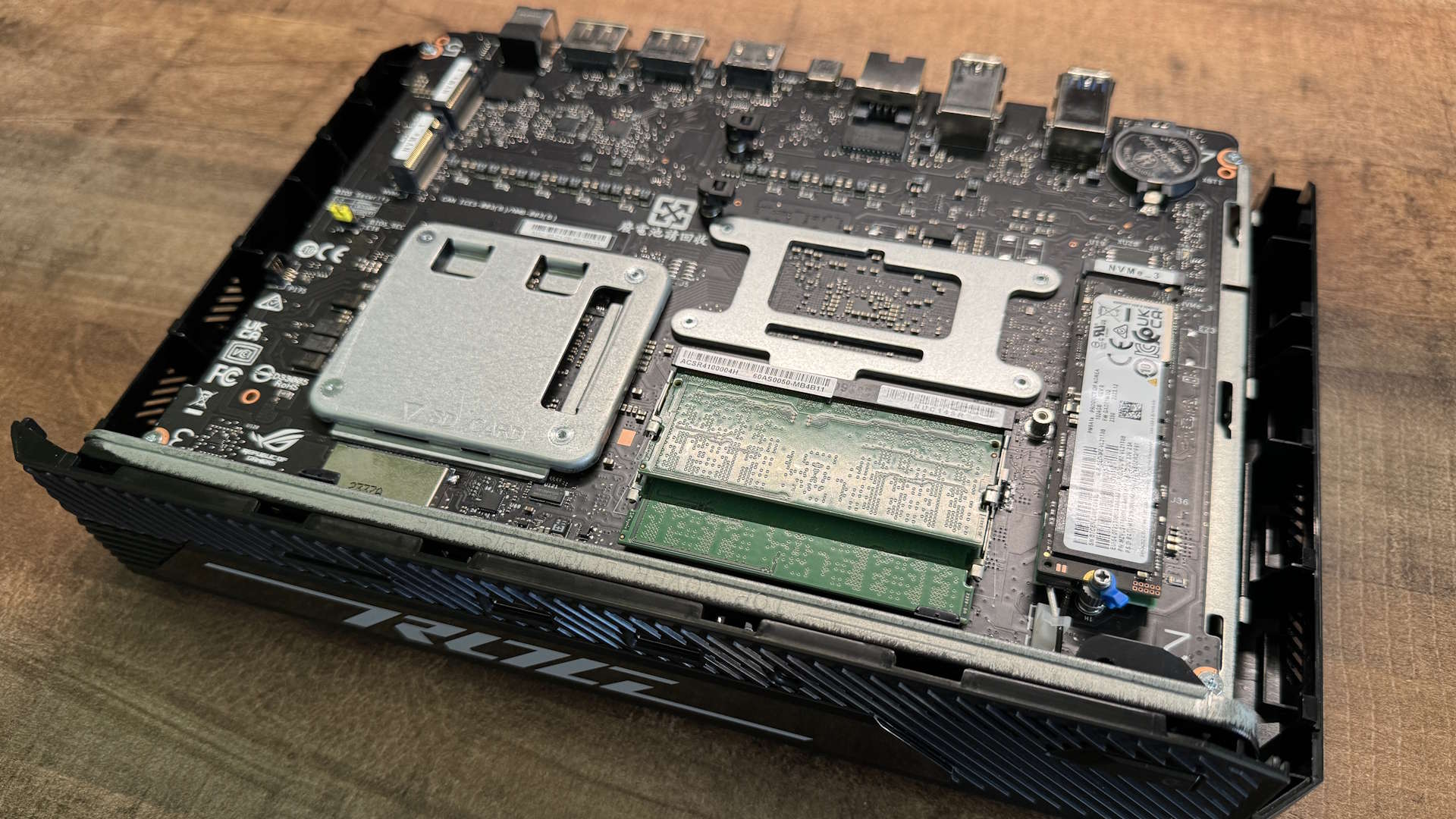
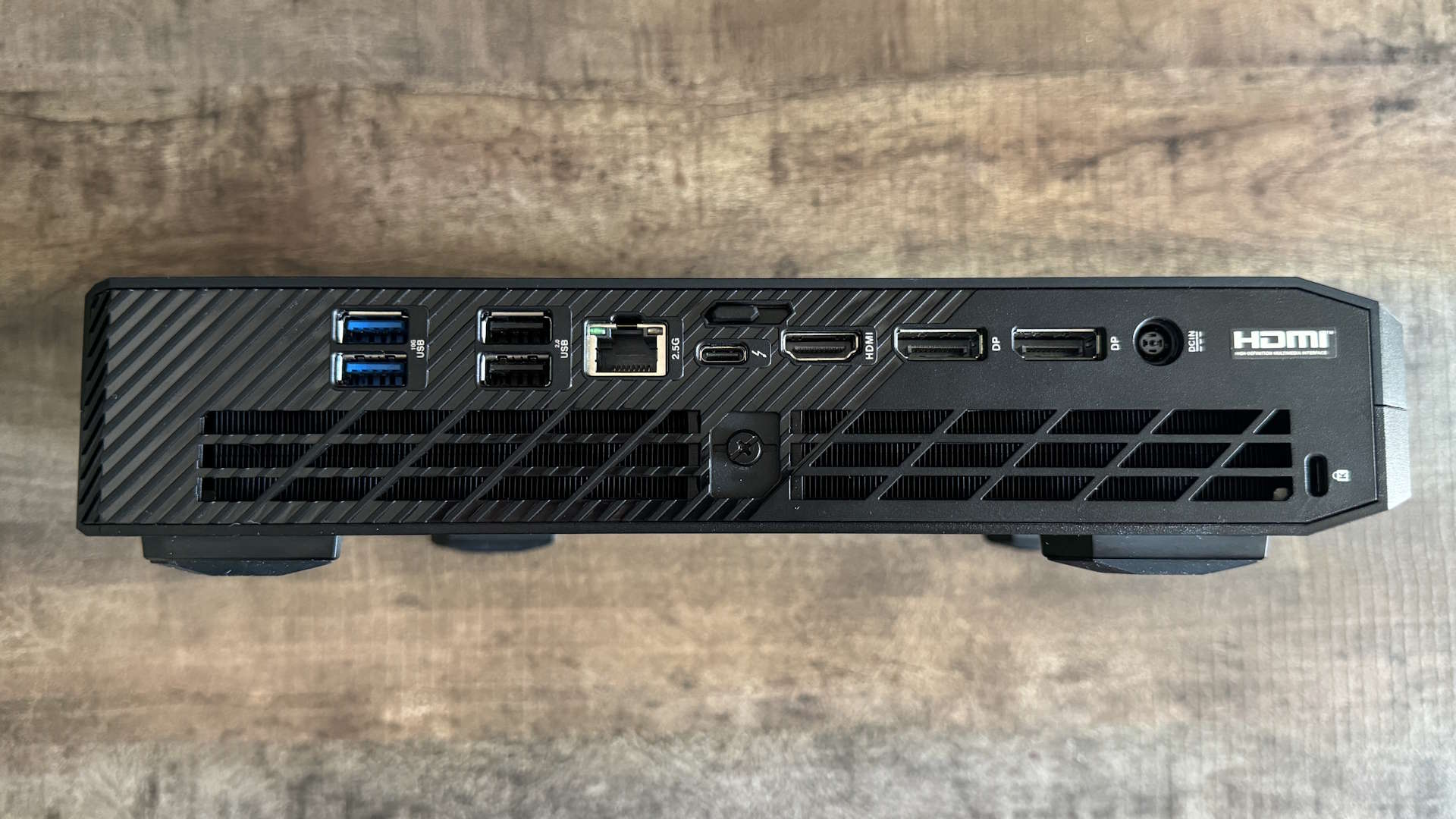
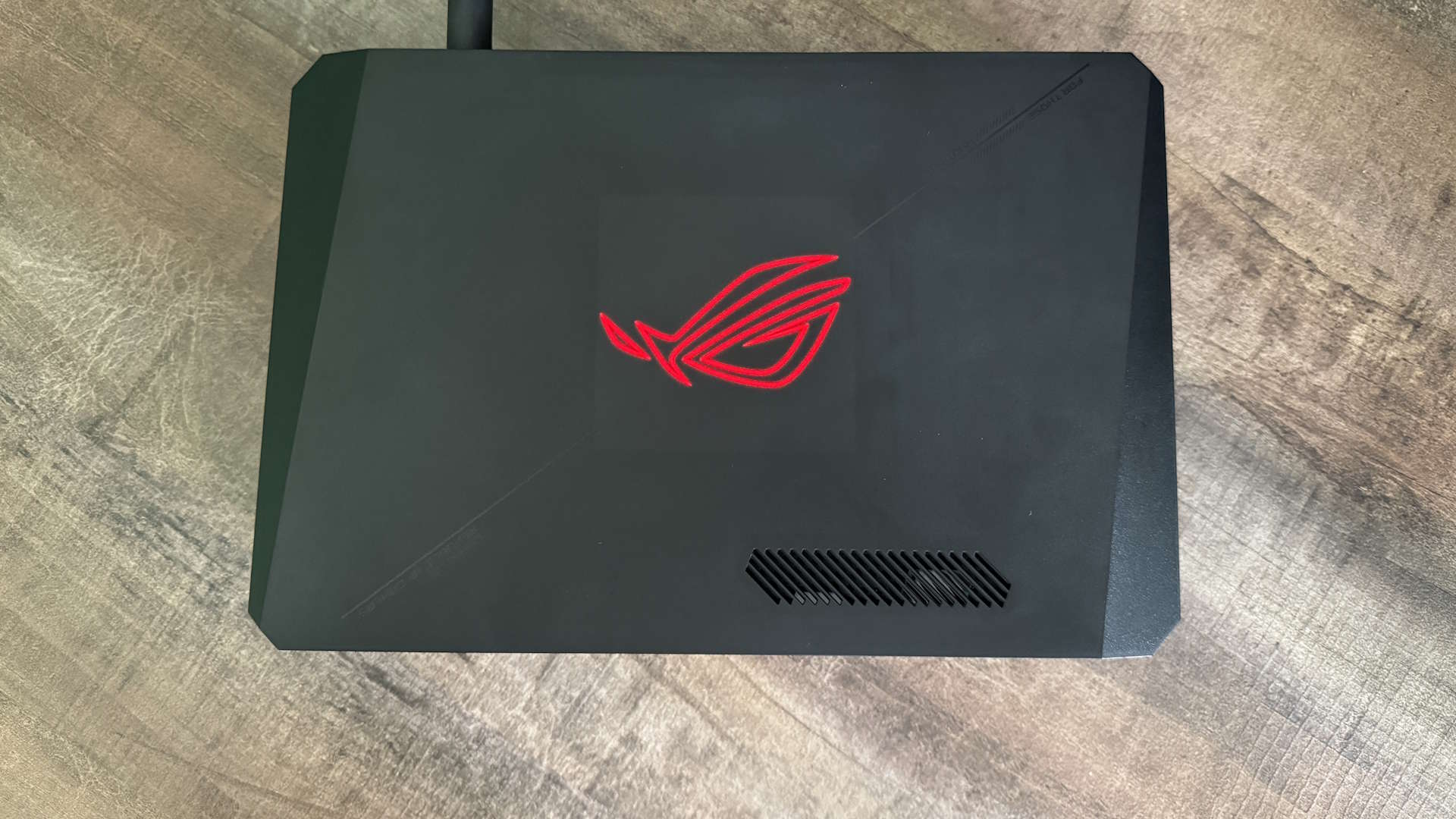
Even with its mobile-focused parts, the ROG NUC 970 offers good-to-great frame rates at 1440p.
Elsewhere on the spec sheet, things are similarly tidy. Intel Killer WiFi 6E, Bluetooth 5.3, a trio of M.2 2280 slots running on PCIe 4.0, and 2.5G Intel LAN. The I/O options are largely good. Round the back you get 2x USB 3.2 ports, 2x USB 2.0 slots, a 2.5G RJ45, 2x DisplayPort 1.4a ports, a single HDMI 2.1 port, and a lone Thunderbolt 4 port which also doubles up as DP 2.1 for the CPU's Intel Arc iGPU, which you will absolutely never have a reason to use over the RTX 4070.
Up front you get another two USB 3.2 slots, combined audio jack, and an SD card reader. Where the IO sorely lacks is in USBC ports, especially up front. A single type-C Thunderbolt 4 at the back doesn't really cut it on such a premium product. I don't know about you but the majority of cludge I plug into my PC these days (phone, headset dongle, mechanical keyboard, Xbox Elite gamepad dock) operates via USBC. If I'm buying this for its compact minimalism, I don't want to spoil it with an external USBC hub flapping about.
On to performance then, and the headline is straightforward enough: even with its mobile-focused parts, the ROG NUC 970 offers good-to-great frame rates at 1440p, and outstanding ones at 1080p.
76 fps in Cyberpunk 2077 at 1440p at the Ray Tracing Ultra preset, DLSS set to auto and frame-gen on is as smooth and good-looking as you need. Total War: Warhammer 3 at Ultra settings just makes it to 60 fps. Forza Mortorsport clips along at 68 fps with Ultra settings, full-quality DLSS and Ray Tracing at 1440p. And if 1080p is your playground, you'll see frame rates thunder well beyond the 100 fps mark in pretty much everything you throw at it bar Homeworld 3, with its surprisingly punishing built-in benchmark
We also gave the ROG NUC 970 a run at several titles outside of our benchmark suite. We haven't added these findings to our official list of numbers as these games don't have built-in benchmarks tools, but we think getting a frame rate range and a general vibe for how it runs stuff at 1440p is still useful.
The Dead Space remake performs admirably at 1440p/Ultra/DLSS balanced, and in the final boss battle, we saw between 75 and 107 fps. Even with that variance in range, the action remained buttery-smooth. It's a similar story in Helldivers 2, where, regardless of the scene, the ROG NUC 970 knocks out an unflinching 70-73 fps at 1440p Ultra with textures set to high. A Plague Tale: Requiem's 'Hives' level saw 74-94 fps at 1440p ultra, with DLSS set to quality and Frame Gen on. In short, all three titles play silky smooth and stutter-free.
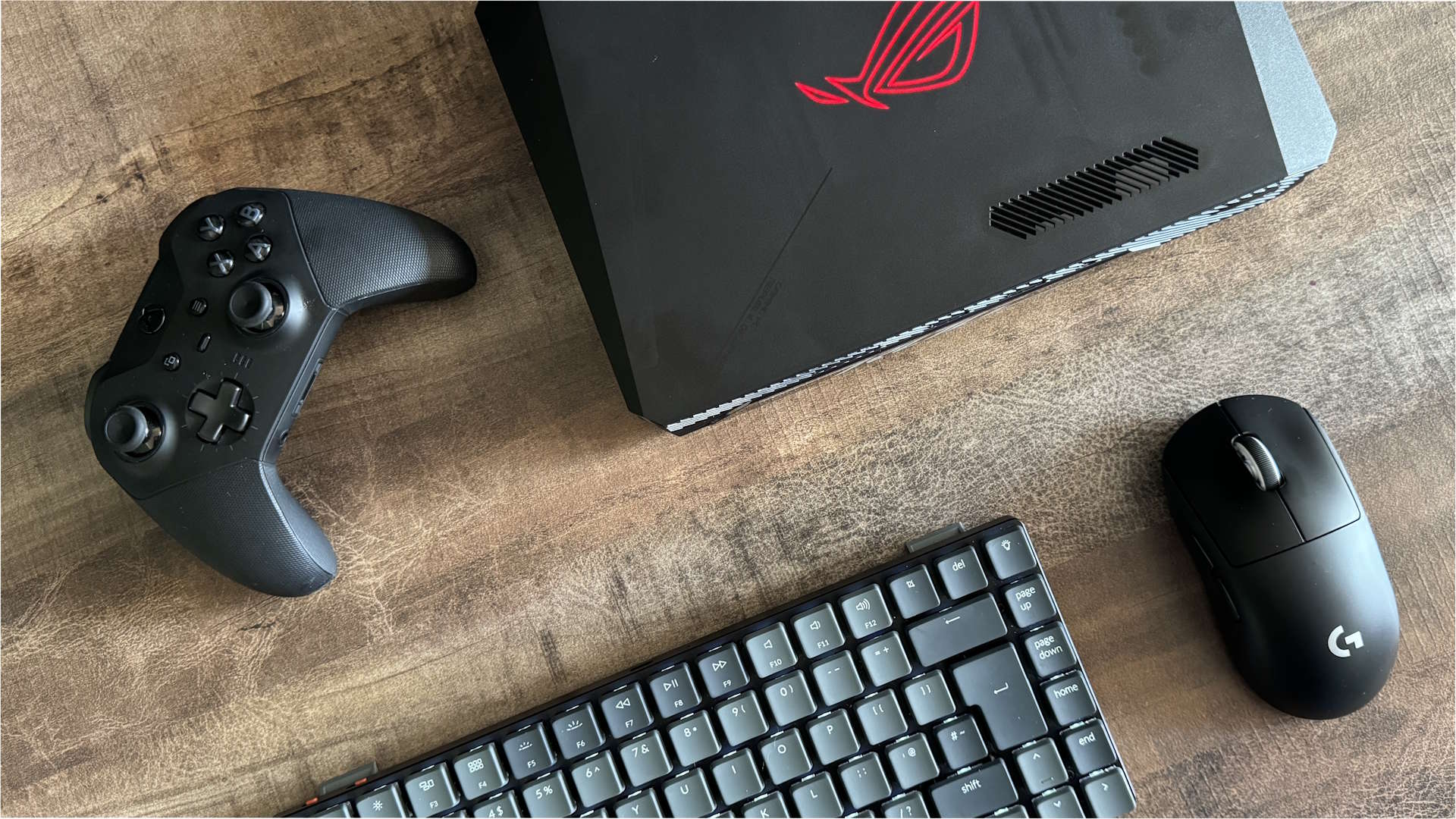
✅ Money's no object: If you want a performant mini gaming PC that delivers at 1440p and don't care what it costs, Asus will be your huckleberry.
✅ You’re not a fan of jiggling with a PC’s innards: Not everyone wants to get elbow deep into their PC case, so if you just want a plug and play PC here it is.
❌ You value an upgrade path: This is not a machine with future CPU or GPU upgrade potential.
It's compact and it does the business at 1440, no question. So let's tackle the elephant in the room: the price tag. Because at $2,199 (£1,999) fully loaded with RAM and storage, the ROG NUC 970 is eye-wateringly expensive for what it does.
How much of that price is down to the R&D costs the ROG NUC 970's unique design implies, how much is down to ASUS adding its ROG-brand markup, and how much is down to the specific component choice is impossible to guess at, but the fact is, it's a very expensive way to game at 1440p. It certainly won't win over any seasoned system-builders; for the same outlay as the full-fat ROG NUC 970, you could build a machine around a desktop RTX 4080 Super and enjoy massively better frame rates at 1440p, or comfortably make the leap to 4K, though you'd be trading the ROG NUC's USP—compactness—for that performance.
But that's not who this machine is aimed at. It's for the PC gamer who wants faff-free fun at 1440p, in the most petite package possible, and doesn't care about a future upgrade path beyond memory and storage. If that's you, and you're willing to part with this kind of money, I don't think you'll be disappointed. Better still, If you're up for shopping around for DDR5, storage, and a Windows key, go for the Barebones version and install them yourself. You'll save yourself literally hundreds.



